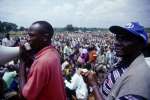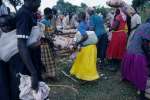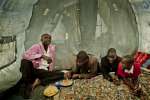- Text size
 |
|  |
|  |
| 
- عربي
UNIQLO distributes 10 millionth item of clothing to refugees with UNHCR
News Stories, 4 June 2015
KAMPALA, Uganda, June 4 (UNHCR) – The UN refugee agency's relationship with UNIQLO passed a major milestone at a recent distribution in Uganda, where staff handed out the 10 millionth piece of clothing donated by the Japanese retail giant to refugees worldwide.
The event in Kampala last month will be followed by further distributions in the coming weeks, which will benefit more than 400,000 refugees across Uganda. In the capital, the lengthy queue was not enough to dampen the spirits of the refugees. They spoke of their joy at receiving t-shirts, jumpers, trousers, coats and other used clothes donated by customers in UNIQLO stores in several countries.
"I think my children will be ecstatic," said Jonathan, a refugee and pastor from the Democratic Republic of the Congo. "These clothes will keep them warm and protect them [at night]."
Jonathan continues to carry out religious work in Kampala, while his wife works as a seamstress. Together, they bring in just enough to pay the rent and feed their family of eight, but there's little left over for anything else.
The UNIQLO donation will make a real difference to the lives of many refugees, who are struggling to make ends meet. "I have six children, all of whom need clothes. It's not easy to provide for all of them," Jonathan noted.
Many of the refugees at the clothes distribution were parents and all agreed on the importance of their children wearing suitable clothing. "When they see other kids wearing clothes that don't have holes or aren't ripped, they feel bad about themselves, they feel inadequate," explained Marion, also from the DRC. "Wearing the same clothes every day brings dust and bacteria and the children get sick," she added, highlighting the link between clothes and health.
"It [not having clothes] really impacts on the children and the whole family," said Sofia, a refugee from Somalia. "It affects their thinking, they start considering take up risky activities in order to be able to have the nice clothes."
UNIQLO has worked in partnership with UNHCR for close to a decade, donating clothing to refugees through the innovative All-Product Recycling Initiative. Customers are encouraged to bring in second-hand clothes that are in good condition and these are donated to refugees.
The company has, since 2006, donated more than 10 million items of clothing to forcibly displaced men, women and children in more than 37 countries, as well as providing millions of dollars in financial contributions.
By Charles Yaxley in Kampala, Uganda





















































